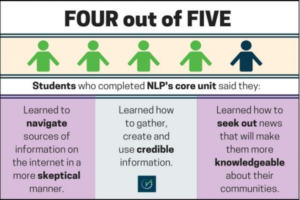Survey shows strong, consistent gains in students’ news literacy knowledge and habits
Students who complete the News Literacy Project’s core unit report significant changes in the ways they think about, share and respond to news and information they read or watch online, new survey data indicate.
 More than 80 percent of the students who responded to the survey said that the unit:
More than 80 percent of the students who responded to the survey said that the unit:
- Improved the way they gathered, used and produced credible information.
- Improved their ability to distinguish quality journalism from other types of news and information.
- Increased their ability to use news to become knowledgeable about their communities, the nation and the world.
- Learned how to exercise civility, respect and care in online communities.
“The News Literacy Project is transforming student consciousness from being insular and impressionable to worldly and critical,” said Jeff Zimmerman, technology director at Our Lady of Tepeyac High School in Chicago.
“My students have a new understanding of the ways that powerful individuals and groups seek control over information to shape public response to important issues. I believe they will carry that insight with them into college and beyond, contributing to a generation of independent thinkers.”
The results come from NLP’s 2015-16 national assessment survey. They are based on pre- and post-unit surveys of students’ attitudes, knowledge and behavior and were collected and analyzed by Anita M. Baker, NLP’s independent evaluation consultant.
The surveys have consistently showed significant changes in students’ knowledge, attitudes and behavior since NLP began administering them in 2009.
“It is difficult to overstate the importance of meaningful formal assessments of student learning,” said Peter Adams, NLP’s senior vice president for educational programs. “It’s not only vital for our teacher partners, but it helps us evaluate and improve our instructional design and resource development. It’s an irreplaceable part of our ongoing mission to provide educators with materials that help them engage and activate students as news literacy learners and citizens.”
In the most recent survey, students also reported that NLP lessons made them more likely to post a comment on a blog (40 percent), ask a news organization to correct a factual error (41 percent) and vote in a local, state or national election when they are old enough to do so (62 percent).
“The News Literacy Project has skillfully taken on the urgent mission of showing young people how to bring critical judgment to their news consumption,” said Martin Baron, executive editor of The Washington Post, one of NLP’s 33 partner news organizations.
“It’s surpassingly important work — absolutely critical to democracy and civil society.”